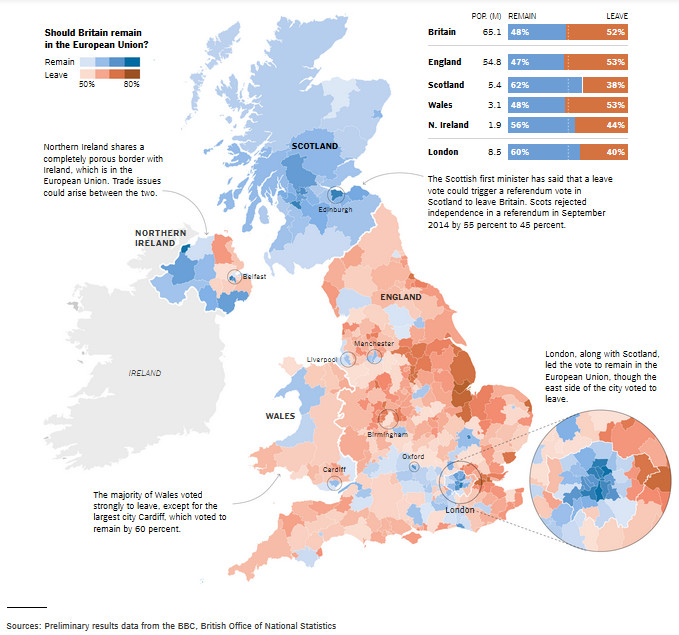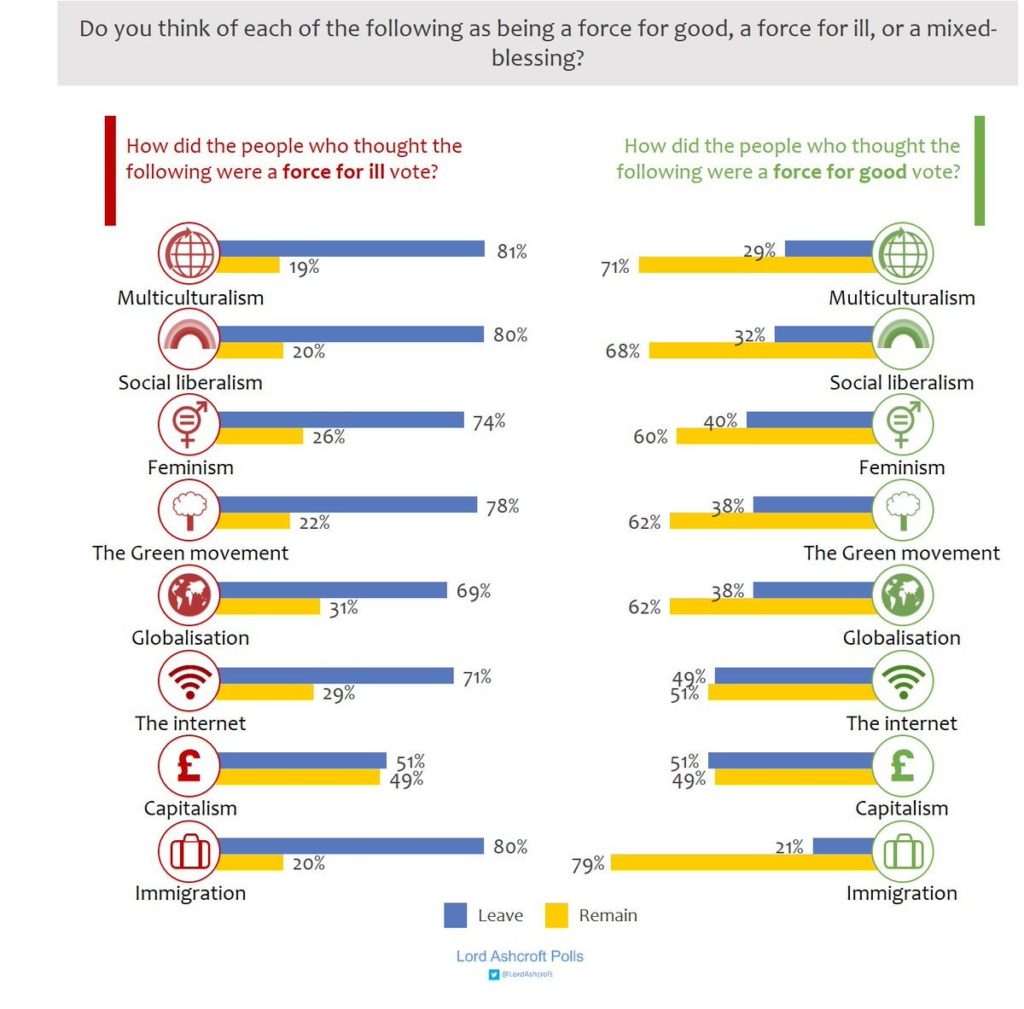Least among the problems posed by the UK’s Brexit vote to leave the EU are the actual effects that will be felt in the UK; there is so much more at stake in the wider world, not least the general global mentality, the post-WWII international system, the future unity and stability of Europe, the ability for the world to tackle its collective challenges, and the election and even the specter of secession in America. In the end, a Brexit does not bode well for any of these.
Originally published on LinkedIn Pulse June 26-27, 2016
By Brian E. Frydenborg (LinkedIn, Facebook, Twitter @bfry1981) June 26-27th, 2016

The Economist
AMMAN — Apart from the many negative and potentially-and-likely disastrous series of effects on England, Wales, Scotland, and Northern Ireland—what is now but perhaps not for long known as the United Kingdom—there are far greater things at stake in the wake of the UK’s vote to leave the European Union, popularly termed “Brexit.”
This vote result—which The Economist termed a “senseless, self-inflicted blow”—occurred even after British Prime Minister David Cameron secured a number of important and unprecedented concessions from the EU; it clearly wasn’t enough for the majority of Britons who voted to leave, 51.9% over the 48.1% of voters who wanted to stay and by a margin of nearly 1,270,000 votes out of over 33,550,000 total cast, or 72% of eligible voters.

The New York Times
Brexit: A Bookend on the Post-WWII Era?
Over three months ago, I wrote how between trends in the EU and Trump’s rise in America, Western democracy was not looking so good. Now, with the Brexit vote beginning the process of the UK’s severance from the EU, and possibly-and-likely the fracturing of the UK itself to the degree that possibly only England and Wales will remain, 2016 may very well be remembered as the year the post-WWII international system—at least in Europe—began to unravel. This was a world order based on coming together, and on a political and economic union in Europe supporting a military union that would make the division, strife, conflict and wars that had devastated the continent since ancient Rome’s fall a thing of the past. After WWII, Western, Northern, and much of Southern Europe eastward through Greece slowly came together over decades; after the fall of the Berlin Wall and the iron curtain, this process of integration proceeded much more rapidly and included much of Eastern Europe. Since WWII, the trend has been one of coming together.
A few days ago, with the Brexit vote, that trend, which had already been slowing considerably in Europe, seems to have come to an irrevocable, screeching halt, and the gear seems to have been switched to reverse.
As an American who cares deeply about the international world order, I know that a strengthening European Union that could be a true partner in promoting peace, security, and justice around the world would be most welcome, as the U.S. acting to shoulder most of the burden has not seemed the best, let alone the most sustainable, model. Recent crises in Syria, Libya, and Ukraine beg questions about what a more unified, determined, and enthusiastic Europe could have achieved, working as a true partner with the U.S., not just a junior one. As bad experiences in Iraq and Afghanistan, and paranoia over immigration and terrorism, drive a mentality of far lower engagement in the collective mind of the U.S. public, the Brexit could not have come at a worse time in recent memory for those looking to see another center of gravity besides the United States emerge to put their money where their mouth is in terms of promoting a just world stability.
The Brexit, then, basically signals to a weary American public to not count on Europe to increase its role on the world stage, or in any way help to shift the global leadership burden away from a United States whose public seems increasingly unwilling to shoulder that responsibility. This bodes ill for the world’s ability to tackle its greatest collective challenges.
Dark Days for Europe
Beyond the aforementioned, Brexit signals that Europe is now ripe for new divisions and quarrels that could, over time, undo much of the progress made since WWII. In my piece where I discussed how Western Democracy is on trial, I noted that Russia is actively “poking and prodding” Europe from Europe’s edge, orchestrating war in Ukraine, menacing parts of Eastern Europe, fomenting unrest, and both forming relationships with and funding right-wing extremist parties. Make no mistake about it, Putin is ecstatic over the Brexit result; anything that weakens European unity and sees the rise of the right plays directly into his hands and there is no doubt that Putin is mightily pleased at the prospect of a weaker and more divided Europe; such divisions provide opportunities for Russian influence and meddling as Putin seeks to peel away parts of Europe into his ideological, economic, political, and perhaps eventually military camps. We see in Eastern Europe, specifically in Ukraine, the chance of open, armed conflict to occur; Kosovo (which Russia is still very upset about) is also ripe for mischief, as is Northern Ireland currently, especially after the Brexit vote.
Bad Signs for America
In the U.S., this emphatically anti-establishment, populist decision by UK voters has also caused alarm for Hillary Clinton and her supporters and given comfort to Trump (who called the vote to leave “a great thing”) and his supporters in the U.S., even if the result hardly makes a Trump victory in November a foregone conclusion. If anything, this vote makes even more painfully obvious what should already have been obvious: what we think of as “Trumpism” is a global phenomenon of anti-“Establishment” rage, from the Tea party to the Arab Spring to the Occupy movement, and now to the Brexit vote; there are clearly both liberal and conservative versions of this, exemplified in the U.S. by Bernie Sanders’ “Sandernistas” on the left and the Tea Party/Trump supporters on the right. The low turnout of youth voters in the Brexit vote—who overwhelmingly voted to remain in the EU—should also cause Clinton concern as questions remain as to how young Bernie Sanders supporters will behave come November, when not voting for Clinton will help Trump and youth turnout could become the deciding factor in who sits in the White House’s Oval Office.
Something else that makes me nervous after this vote and which generally hasn’t yet gotten much mainstream scrutiny is what I regard as the very real possibility of secessionist movements arising in the United States to a serious level, with the Brexit vote as a major part of the inspiration; many of the left simply can’t stomach the idea of a Trump presidency, and many on the right feel the same about Hillary Clinton, and I imagine large numbers of people will be receptive to secessionist arguments in certain locations of the country, depending on who wins; even one state in America seriously moving to secede would create an internal national crisis not seen in America since 1860, when secession precipitated the American Civil War(1861-1865). It may not happen, but I would put the chances of a serious secessionist movement emerging in the very-near-future at it highest since the Civil War.
Sadly, Americans—least of all young Americans—cannot take it for granted that love will trump hate…
A Rotten and Backwards Mentality
Perhaps most disturbingly, the UK leave vote is just the latest in a pervasive Western trend of voters irrationally favoring xenophobia and nationalism to their own personal and national detriment.

As Fareed Zakaria noted on his CNN show this week, “The new politics of our age will not be left vs. right, but open vs. closed.” The last time the world lurched in the direction a closed mentality favoring nationalism, ethno-centrism, and insulation, the world was propelled into WWII. It seems the Brexit vote to leave the EU was fueled more by angst over immigration (all part of ethno-centric identity politics) than anything else, just as is the case with the rise of Trump in America; Brexit was a vote to be a less diverse, more closed society.
Not least of all to note among all the issues surrounding the Brexit is that one of its strongest opponents, Member of Parliament and passionate supporter of integration, diversity, justice, and human rights Jo Cox was assassinated in an act of terrorism that targeted her for her beliefs, a killing timed shortly before the vote. Perhaps the only silver lining in this sorry experience is that she did not live to see her beloved UK vote to make such a regrettable decision, one that would have pained her deeply.
How to Avoid War Amid So Much Hate, Fear, & Division?
If 2016 truly does mark the end of an era of increasing openness that lasted from 1945-2016 and the beginning of populations saying “No!” to globalization and “No!” to reasonable, measured centrism, the real question we must all start asking ourselves right now is, if, for the time being, a more closed, insular, nationalist, and bigoted world is where we are headed, how will we be able to operate in such a world to avoid the massive levels of armed conflicts those mentalities have always produced in the past?
The answers are not easy or even apparent, but this question must be central to our politics and our worldview in the post-Brexit world. I personally hope that, if this is the direction in which humanity is headed, there is a way to avoid large-scale conflict, but I am not sure I can objectively say that I hold this hope with a high level of confidence. Yes, we can take hope that, whether with Trump in America or the Brexit vote in the UK, the rising generation is clearly choosing openness and diversity over being closed and bigoted (for the time being, anyway); at least in the UK, though, we see that the old and fearful carried the day and have set the course of the UK for time being, and younger voters turned out in significantly lower numbers than older voters. Will these trends be mirrored in the U.S.? It appears to be too late to stop Europe’s rightward lurch at the hands of the old and fearful, at least for some time; should the U.S. follow suit, I tremble for the West, democracy, and the world.
If you appreciate Brian’s unique content, you can support him and his work by donating here.
Here are many more articles by Brian E. Frydenborg. If you think your site or another would be a good place for this content please do not hesitate to reach out to him! Feel free to share and repost on LinkedIn, Facebook, and Twitter (you can follow him there at @bfry1981)